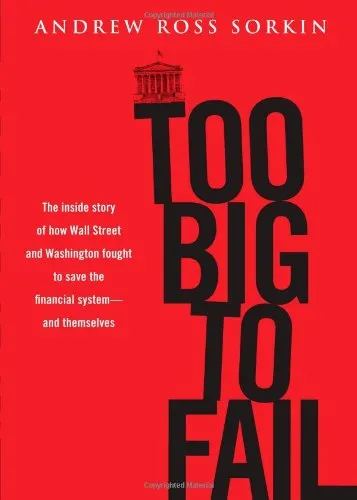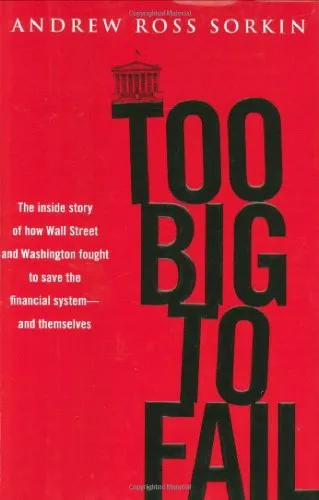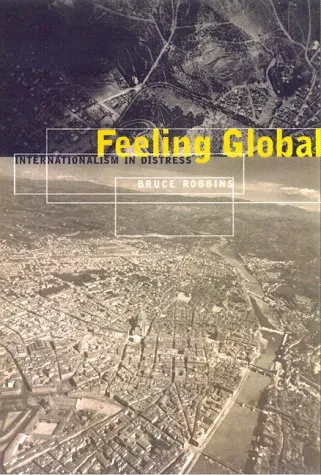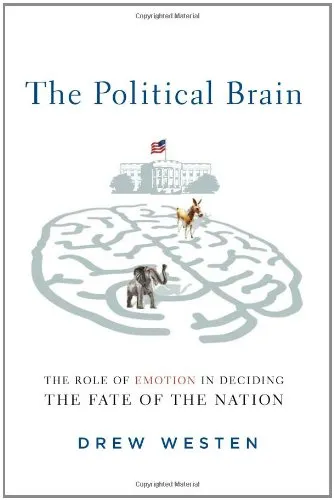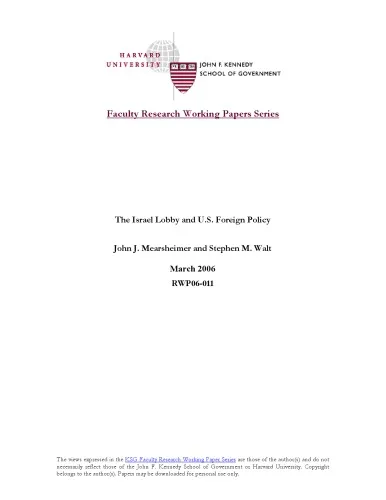Democracy against Capitalism: Renewing Historical Materialism
4.5
بر اساس نظر کاربران

شما میتونید سوالاتتون در باره کتاب رو از هوش مصنوعیش بعد از ورود بپرسید
هر دانلود یا پرسش از هوش مصنوعی 2 امتیاز لازم دارد، برای بدست آوردن امتیاز رایگان، به صفحه ی راهنمای امتیازات سر بزنید و یک سری کار ارزشمند انجام بدینکتاب های مرتبط:
معرفی کتاب "Democracy against Capitalism: Renewing Historical Materialism"
کتاب Democracy against Capitalism: Renewing Historical Materialism اثری برجسته از الن مایکسنز وود است که به بررسی روابط پیچیده میان دموکراسی و سرمایهداری میپردازد. این اثر، تحلیلی عمیق بر پایه Historical Materialism ارائه میدهد و به مفاهیمی همچون طبقه، قدرت و اقتصاد در دوران مدرن میپردازد.
خلاصه ای از کتاب
در این کتاب، الن مایکسنز وود استدلال میکند که سرمایهداری یک نظام اجتماعی و اقتصادی است که عملاً دموکراسی را تضعیف میکند. وود توضیح میدهد که مفاهیم دموکراسی در دوران تاریخ بشر چگونه تغییر کرده و با ظهور سرمایهداری، این مفاهیم چگونه از جوهره اصلی خود دور شدهاند. او نقدی دقیق از برداشتهای لیبرالی و مارکسیسم سنتی از مفهوم دموکراسی ارائه میدهد و تلاش میکند به جایگاه Historical Materialism در تحلیل مناسبات اجتماعی و سیاسی تاکید کند.
وود بر این باور است که دموکراسی واقعی نمیتواند در بستر سرمایهداری عمل کند، زیرا طبیعت سرمایهداری مبتنی بر استثمار اقتصادی و شکافهای طبقاتی است. این سیستم، نه تنها بر روابط اجتماعی بلکه بر مفهوم شهروندی و مشارکت سیاسی نیز تاثیر میگذارد. در نتیجه، وود رویکردی تازه برای فهم تاریخ و اقتصادیات سیاسی ارائه میدهد که مبتنی بر بازنگری در اصول Historical Materialism است.
نکات کلیدی کتاب
- تضاد و تقابل ذاتی میان اصول دموکراسی و عملکرد سرمایهداری.
- تحلیل دقیق Historical Materialism و نقش آن در درک مفاهیم قدرت، طبقه و اقتصاد.
- نقد برداشتهای سطحی و غیرتاریخی از دموکراسی و مدرنیته.
- ارائه راهکارها و نگرشهای جدید برای درک بهتر مناسبات اجتماعی در دوران معاصر.
نقل قولهای معروف از کتاب
"The relationship between democracy and capitalism is not one of mutual reinforcement, but of inherent conflict."
"Capitalism, by its very logic, reduces politics to economics, and undermines the conditions for truly democratic self-determination."
چرا این کتاب مهم است؟
کتاب Democracy against Capitalism به دلیل تحلیل دقیق و عمیق خود از مفاهیم حیاتی سیاسی و اقتصادی، اثری بسیار مهم در زمینه علوم اجتماعی و سیاسی به شمار میآید. اهمیت این کتاب در این است که وود نه تنها به نقد تاریخی و نظری میپردازد بلکه راهکاری فکری برای درک و تجدید نظر در رابطه میان دموکراسی و سرمایهداری ارائه میدهد.
در زمانی که مباحث سیاسی و اقتصادی در سطح جهانی بر جنبههای محدود به مدلهای لیبرالی و سرمایهداری متمرکز شدهاند، این کتاب یادآوری میکند که ساختن جامعهای دموکراتیکتر نیازمند بازاندیشی اساسی است. این اثر منبع ارزشمندی برای پژوهشگران، دانشجویان، و هر کسی است که به دنبال تحلیل ساختارهای قدرت و مناسبات اجتماعی در دوران معاصر است.
Introduction to "Democracy against Capitalism: Renewing Historical Materialism"
"Democracy against Capitalism: Renewing Historical Materialism" by Ellen Meiksins Wood is a groundbreaking contribution to the field of Marxist theory and political philosophy. Written with unparalleled intellectual depth, the book explores the dynamic relationship between democracy, capitalism, and the historical materialist tradition. Wood critiques the liberal-capitalist ideological framework while drawing attention to the roots of democracy within materialist and class-conscious struggles.
In this work, Wood reinvigorates Marxist thought by linking the historical trajectory of capitalism to the degradation of democratic ideals. Her sharp analysis questions the assumptions underlying liberal democracy, such as the detachment of politics from economics, and exposes how capitalism actively undermines genuine democratic participation. The book is not merely a critique but also a call to reimagine historical materialism as a robust analytical framework to combat contemporary political and economic crises.
Detailed Summary of the Book
"Democracy against Capitalism" is divided into several crucial arguments that trace the intersections of capitalism, democracy, and Marxist historiography. Wood begins by critiquing the revisionist tendencies in Marxist theory, highlighting how many debates of the twentieth century have diluted historical materialism, focusing instead on abstract debates or cultural interpretations. She stresses the need for a return to the classical Marxist method of grounding historical analysis in material social relations, particularly class struggle.
One of the central themes of the book is Wood’s contention that capitalism must not be understood simply as an economic phenomenon but as a systemic social order that transforms human practices, particularly by separating the political from the economic. She argues that this separation is at the heart of capitalism's ideological power, as it naturalizes economic inequalities while presenting the capitalist marketplace as a politically neutral sphere. Wood's analysis demonstrates how this separation undermines the possibility of genuine democracy by limiting popular control over economic and social life.
Wood also traces the historical emergence of capitalism, situating its origins in specific social relations rather than technological or cultural changes. She contrasts the capitalist mode of production with earlier forms of economy and governance, highlighting the radical transformation that capitalist social relations impose on democracy. Furthermore, the book advocates reclaiming democracy as an egalitarian and collective practice, grounded in social relations rather than market-driven mechanisms.
Wood concludes by suggesting that historical materialism remains uniquely equipped to uncover the contradictions of capitalism and enable political struggles aiming for democratic emancipation. By unpacking the ideological underpinnings of liberal democracy and capitalism, she presents a renewed vision of Marxism as a necessary tool for understanding and transforming modern society.
Key Takeaways
- The separation of the political and economic spheres is central to the ideological justification of capitalism.
- Democracy and capitalism are inherently contradictory, as the latter restricts collective decision-making and social equality.
- Historical materialism, rooted in class analysis, offers a powerful framework for understanding and resisting capitalist domination.
- The history of capitalism is not inevitable or universal but the product of specific social relations and class struggles.
- A reimagined version of democracy must emerge outside the confines of capitalist institutions, prioritizing collective and egalitarian governance.
Famous Quotes from the Book
"Democracy was born in the context of class struggle and is best understood not as a gift from enlightened elites but as a product of popular movements."
"Capitalism displaces political power from the public sphere into private hands while presenting this as the natural order of things."
"The defining characteristic of capitalism is not the mere existence of markets but the emergence of market imperatives as the dominant force shaping human life."
Why This Book Matters
"Democracy against Capitalism" matters because it challenges one of the core assumptions of modern political discourse: the compatibility of capitalism and democracy. In a time when global economic inequality is reaching unprecedented heights and democratic institutions are increasingly hollowed out, Wood’s incisive critique provides both a diagnosis and an alternative perspective rooted in Marxist thought. By pointing out that democracy, in its truest form, cannot coexist with the exploitative structures of capitalism, Wood raises critical questions about the future of social and political organization.
The book is essential reading for activists, scholars, and anyone concerned with the erosion of democratic principles under neoliberal capitalism. Wood’s commitment to rekindling historical materialism makes the book a potent theoretical tool for those seeking to understand and transform the world. It not only reaffirms the relevance of Marxist analysis but also inspires readers to imagine new possibilities for democratic empowerment beyond the confines of capitalism.
By combining rigorous scholarship with a passionate critique of power and inequalities, "Democracy against Capitalism" stands as a landmark text within the broader struggle for justice and freedom.
دانلود رایگان مستقیم
شما میتونید سوالاتتون در باره کتاب رو از هوش مصنوعیش بعد از ورود بپرسید
دسترسی به کتابها از طریق پلتفرمهای قانونی و کتابخانههای عمومی نه تنها از حقوق نویسندگان و ناشران حمایت میکند، بلکه به پایداری فرهنگ کتابخوانی نیز کمک میرساند. پیش از دانلود، لحظهای به بررسی این گزینهها فکر کنید.
این کتاب رو در پلتفرم های دیگه ببینید
WorldCat به شما کمک میکنه تا کتاب ها رو در کتابخانه های سراسر دنیا پیدا کنید
امتیازها، نظرات تخصصی و صحبت ها درباره کتاب را در Goodreads ببینید
کتابهای کمیاب یا دست دوم را در AbeBooks پیدا کنید و بخرید
1471
بازدید4.5
امتیاز0
نظر98%
رضایتنظرات:
4.5
بر اساس 0 نظر کاربران
Questions & Answers
Ask questions about this book or help others by answering
No questions yet. Be the first to ask!


